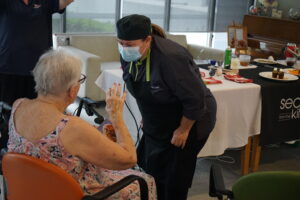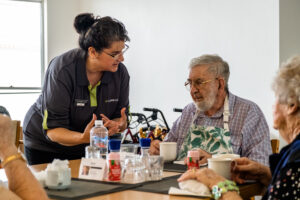As Dementia Action Week continues, we’d like to take the time to discuss the importance of the human touch when caring for aged care residents experiencing dementia. Dementia can cause people to act in ways that they would normally not even consider; even if their behaviour is not reflective of their true feelings, they may become aggravated, lash out, shut down, or be otherwise uncooperative or hostile to those around them – including the catering team. It’s important for aged care catering teams and carers to understand the behavioural issues that dementia may result in, and have the knowledge and compassion to respond with kindness instead of fear or anger.
Breaching the communication barriers
Each and every individual’s experience of dementia is different, and there’s no one size fits all approach that can be taken towards caring and catering for aged care residents who may be experiencing the disease. As dementia progresses, sufferers may experience fairly radical shifts in personality and behaviour, which can sometimes be expressed as outward lashes of fear or hostility. Without appropriate training on dementia and its impacts, it’s all too easy for carers and caterers to attribute what might be a show of fear and confusion to rudeness. For a newer member of the aged care catering team who may not have worked with many residents with dementia or isn’t familiar with this resident’s condition, these outbursts of perceived hostility can be quite confronting.
Carers and caterers should be aware of a few acute behavioural changes that may affect the resident’s mealtimes as dementia progresses.
It’s important to understand that when these behaviours manifest they’re usually an expression of fear, confusion, or anger and frustration at not being able to communicate and engage with the world as effectively as they used to be able to. This hostility often isn’t truly directed at the caterers trying to help them; it’s the result of emotions flaring and bubbling over as the condition hurts their ability to interact with those closest to them.


The imperative of empathy and understanding
As a direct result of all of the above, fostering an environment built on empathy and understanding is key to providing quality care for residents with dementia. Aged care facilities are more than just a sterile place elderly citizens move to when they require more attention and care than in their younger years; they’re resident’s homes and safe places, and nobody deserves to be treated with disrespect or derision within their own home.
Teaching carers and caterers to recognise and understand the telltale signs of dementia’s behaviours can prevent misinterpretations that could potentially flare up into confrontations. When a carer or caterer is trained in recognising the telltale signs of dementia’s behavioural changes, they’re far more likely to be able to respond with the compassion and empathy needed to deliver ideal care rather than the frustration that may be natural. This approach benefits both carer and resident, as carers and caterers are better equipped to handle outbursts from distressed residents who mean no genuine harm, and residents are not left fearing that they’ve seriously upset or angered a caterer who is simply trying to provide the best care possible.
Conclusion
When caring for aged care residents with dementia, it’s absolutely vital to build an environment of care and compassion that places the best interest of the individual at heart. While caring for elderly citizens who may lash out at those around them during fits of fear or frustration can be a difficult experience for everyone involved, the human factor is always important to consider, and having well trained and patient carers and catering staff can go a long way to easing the difficulties of living with dementia. If you’re interested in learning more about how a well-designed aged care catering solution can help make mealtimes easier for your residents living with dementia, reach out to your local Cater Care team today.
Jonathan Storer
Client Development Manager – Cater Care
Ph: 0424 190 566
jonathan.storer@catercare.com.au
________________________
1 Better Health Channel. 2012a. “Dementia – Behaviour Changes.” Better Health Channel. Victorian Department of Health. 2012. https://www.betterhealth.vic.gov.au/health/conditionsandtreatments/dementia-behaviour-changes. 2 Dementia Australia. 2014. “Understanding Changes in Behaviour .” Dementia.org.au. Dementia Australia . August 4, 2014. https://www.dementia.org.au/about-dementia-and-memory-loss/about-dementia/behaviour/behaviour-changes.